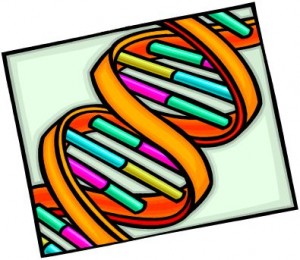 There is a group of diseases called “inborn errors of metabolism” which are caused by a faulty or missing piece of DNA – the blueprint of life that we inherit from our parents. DNA is the chemical memory that stores the string of instructions for how to build every living organism – humans included. If just one DNA instruction becomes damaged or missing then we may lose the ability to make or to remove one specific chemical – and that can lead to a deficiency or an excess of other chemicals – which can then lead to dysfunction – which can then make us feel unwell – and can then limit both our quality and quantity of life. We are a biological system of interdependent parts. If an inborn error of metabolism is lethal it will not be passed on to our offspring because we don’t live long enough – so the ones we see are the ones which and not lethal. We treat the symptoms of an inborn error of metabolism by artificially replacing the missing chemical – but the way to treat the cause is to repair, replace or remove the faulty DNA.
There is a group of diseases called “inborn errors of metabolism” which are caused by a faulty or missing piece of DNA – the blueprint of life that we inherit from our parents. DNA is the chemical memory that stores the string of instructions for how to build every living organism – humans included. If just one DNA instruction becomes damaged or missing then we may lose the ability to make or to remove one specific chemical – and that can lead to a deficiency or an excess of other chemicals – which can then lead to dysfunction – which can then make us feel unwell – and can then limit both our quality and quantity of life. We are a biological system of interdependent parts. If an inborn error of metabolism is lethal it will not be passed on to our offspring because we don’t live long enough – so the ones we see are the ones which and not lethal. We treat the symptoms of an inborn error of metabolism by artificially replacing the missing chemical – but the way to treat the cause is to repair, replace or remove the faulty DNA.
The same metaphor can be applied to any social system. It too has a form of DNA which is called culture – the inherited set of knowledge, beliefs, attitudes and behaviours that the organisation uses to conduct itself in its day-to-day business of survival. These patterns of behaviour are called memes – the social equivalent to genes – and are passed on from generation to generation through language – body language and symbolic language; spoken words – stories, legends, myths, songs, poems and books – the cultural collective memory of the human bio-psycho-social system. All human organisations share a large number of common memes – just as we share a large number of common genes with other animals and plants and even bacteria. Despite this much larger common cultural heritage – it is the differences rather than the similarities that we notice – and it is these differences that spawn the cultural conflict that we observe at all levels of society.
If, by chance alone, an organisation inherits a depleted set of memes it will appear different to all the others and it will tend to defend that difference rather than to change it. If an organisation has a meme defect, a cultural mutation that affects a management process, then we have the organisational condition called an Inborn Error of Management – and so long as the mutation is not lethal to the organisation it will tend to persist and be passed largely unnoticed from one generation of managers to the next!
The NHS was born in 1948 without a professional management arm, and while it survived and grew initally, it became gradually apparent that the omisson of the professional management limb was a problem; so in the 1980’s, following the Griffiths Report, a large dose professional management was grafted on and a dose of new management memes were injected. These included finance, legal and human resource management memes but one important meme was accidentally omitted – process engineering – the ability to design a process to meet a specific quality, time and cost specification. This omission was not noticed initially because the rapid development of new medical technologies and new treatments was delivering improvements that obscured the inborn error of management. The NHS became the envy of many other countries – high quality healthcare available to all and free at the point of delivery. Population longevity improved, public expectation increased, demand for healthcare increased and inevitably the costs increased. In the 1990’s the growing pains of the burgeoning NHS led to a call for more funding, quoting other countries as evidence, and at the turn of the New Millenium a ten year plan to pump billions of pounds per year into the NHS was hatched. Unfortunately, the other healthcare services had inherited the same meme defect – so the NHS grew 40% bigger but no better – and the evidence is now accumulatung that productivity (the ratio of output quality to input cost) has actally fallen by more than 10% – there are more people doing more work but less well. The UK along with many other countries has hit an economic brick wall and the money being sucked into the NHS cannot increase any more – even though we have created a legacy of an increasing proportion of retired and elderly members of society to support.
The meme defect that the NHS inherited in 1948 and that was not corrected in the transplant operation 1980’s is now exerting it’s influence – the NHS has no capability for process engineering – the theory, techniques, tools and training required to design processes are not on the curriculum of either the NHS managers or the clinicians. The effect of this defect is that we can only treat the symptoms rather than the cause – and we only have blunt and ineffective instruments such as a budget restriction – the management equivalent of a straight jacket – and budget cuts – the management equivalent of a jar of leeches. To illustrate the scale of the effect of this inborn error of management we only need to look at other organisations that do not appear to suffer from the same condition – for example the electronics manufacturing industry. The almost unbelieveable increase in the performance, quality and value for money of modern electronics over the last decade (mobile phones, digital cameras, portable music players, laptop computers, etc) is because these industries have invested in developing both their electrical and process engineering capabilities. The Law of the Jungle has weeded out the companies who did not – they have gone out of business or been absorbed – but publically funded service organisations like the NHS do not have this survival pressure – they are protected from it – and trying to simulate competition with an artificial internal market and applying stick-and-carrot top-down target-driven management is not a like-for-like replacement.
The challenge for the NHS is clear – if we want to continue to enjoy high quality health care, free at the point of delivery, and that we can afford then we will need to recognise and correct our inborn error of management. If we ignore the symptoms, deny the diagnosis and refuse to take the medicine then we will suffer a painful and lingering decline – not lethal and not enjoyable – and it is has a name: purgatory.
The good news is that the treatment is neither expensive, nor unpleasant nor dangerous – process engineering is easy to learn, quick to apply, and delivers results almost immediately – and it can be incorporated into the organisational meme-pool quite quickly by using the see-do-teach vector. All we have to do is to own up to the symptoms, consider the evidence, accept the diagnosis, recognise the challenge and take our medicine. The sooner the better!
 Ignorance means “not knowing” and as the saying goes “Ignorance is bliss” because we do not worry about what we do not know about. Or do we?
Ignorance means “not knowing” and as the saying goes “Ignorance is bliss” because we do not worry about what we do not know about. Or do we?
